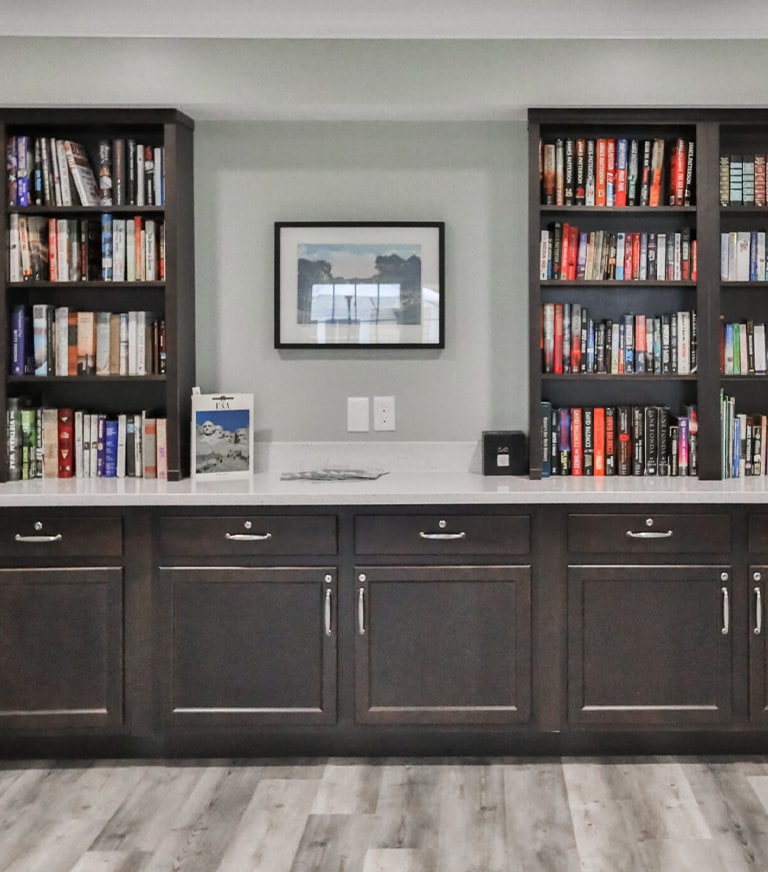It’s natural to want to bring comfort and joy to someone you care for, especially when they’re living in memory care. Visiting a loved one with dementia can help with their transition to senior living and ensure that they know you still care about them. However, you need to strike a balance.
You can’t really visit a loved one with dementia “too much,” but visiting too frequently without consideration of their needs can overwhelm them. Give your loved one time to settle into their new home and respect their needs and routines. There are many fun experiences available in memory care, and you wouldn’t want to cramp your loved one’s style, after all!
Understanding the Dementia Experience
Dementia is a challenging condition that affects memory, thinking, and behavior, making daily life and relationships harder to navigate. You might notice your loved one struggling to communicate, recall special memories, or enjoy time with friends and family over time.
The emotional impact can be just as tough. Your loved one may feel confused, frustrated, or anxious as they face tasks that once came easily to them. That’s why providing consistent support is so important. Your visits can make a big difference, but it’s important to approach each visit thoughtfully to help avoid unnecessary stress.
Pros & Cons of Frequent Visits
Don’t get us wrong, visiting a loved one with dementia is one of the most important things you can do. Your presence brings companionship, love, and a sense of normalcy, reminding them how much they’re cared for. But it’s also important to be mindful of how often you visit and how you approach each visit, as dementia can bring certain challenges.
Benefits of Regular Visits
Checking in with your loved one can:
- Lift their spirits: Visiting often brings comfort and helps ease feelings of loneliness.
- Keep their minds sharp: Even a quick chat or shared activity can spark their memory and keep their mind engaged.
- Build stronger connections: Spending time together strengthens your bond and creates happy memories to cherish.
Challenges of Overstimulation
Visiting your loved one too much could lead to them:
- Feeling exhausted: We all have a social battery. Spending too much time together or visiting too often can overwhelm your loved one, leaving them tired and making it harder for them to recover. This can leave them feeling more agitated.
- Trouble adjusting: If your loved one has recently moved to a memory care community, visiting too frequently might make it harder for them to settle in and adjust, as they could become too reliant on familiar faces instead of engaging with new friends.
The goal isn’t to minimize your involvement in their life but to adapt your visits in ways that promote their well-being.

How Often Should I Visit?
When deciding how often to visit, it helps to consider a few factors to make each visit meaningful. Consider these questions when figuring out your schedule:
- What stage of dementia is your loved one in? If they’re in the early stages, they might enjoy longer visits filled with conversation. In later stages, shorter, quieter visits may feel more comfortable.
- How often would they like you to visit? Do they thrive on frequent social interaction, or do they prefer fewer, more meaningful visits? Pay attention to what feels right for them.
- What is your family’s schedule? Juggling responsibilities isn’t easy. Coordinate with family members to share visits and ease the load.
- What are the community guidelines? Senior living communities often have helpful recommendations to align visits with their care routines.
Everyone’s experience with dementia is different, so stay mindful of how your loved one responds. Finding a balanced visit schedule can help you stay connected and honor their needs at the same time. Here are some tips for making your visits meaningful:
Stick to a Routine
Consistency can make your loved one feel secure. Plan regular visits—weekly or bi-weekly—and align them with their daily schedule. Whether it’s a morning coffee chat or an evening stroll, these moments can mean the world.
Focus on Quality Over Quantity
It’s not about how often you visit, but how meaningful the time spent together is. Focus on activities that your loved one loves, like flipping through old photo albums, doing crafts, or enjoying their favorite music.
Pay Attention to Their Energy
Notice when your loved one feels tired or overwhelmed. If they need a break, shorten your visit and let them rest—it’s okay to keep things flexible.
Team Up with Family & Friends
Coordinate with others to spread out visits. This helps keep your loved one surrounded by familiar faces, while avoiding the possibility that you accidentally overwhelm them with a dozen grandchildren and cousins arriving on the same day.
Work with Care Staff
A good care staff knows what your loved one is going through. They can tell you when your loved one is at their best and when they need time to relax. Chat with them to find the best times to visit and tips on how to make the most of your time together without disrupting their routine.
Let’s Create Brighter Days Together
Visiting a loved one with dementia is all about sharing joyful moments and showing love, even in small ways. A shared laugh, a warm hug, or a simple game of bridge can strengthen your bond in ways that go beyond words.
You can’t change the effects of dementia, but your visits can bring stability, kindness, and comfort that means so much to them.
Peregrine Senior Living at Clifton Park is here to support families like yours. We’ve brought together a caring, expertly trained team and a warm, welcoming environment so we can make a difference in your loved one’s care.
Book a tour today and see firsthand how we make our memory care lifestyle feel like home!











Pet therapy and a friendly game of bowling yesterday! 🐶🎳 ... See MoreSee Less
0 CommentsComment on Facebook
... See MoreSee Less
This content isn't available right now
When this happens, it's usually because the owner only shared it with a small group of people, changed who can see it or it's been deleted.0 CommentsComment on Facebook
Dining at our community is about more than what’s on the plate—it’s about connection, community, and the joy of gathering together.
Our talented culinary team crafts meals that are both delicious and nutritious, offering flavors that comfort and inspire.
From themed dinners to chef demonstrations, each meal becomes an opportunity to savor the moment and celebrate life’s simple pleasures. 🍴
peregrinecliftonpark.com/ ... See MoreSee Less
0 CommentsComment on Facebook
Cheesecake Factory for lunch 🍰🍝 ... See MoreSee Less
0 CommentsComment on Facebook
Carmen and Joe joined us live again for another monthly Peregrine Birthday Party! ... See MoreSee Less
0 CommentsComment on Facebook
The March newsletter is here!
And monthly dinners are back starting with a bang thanks to Home of the Good Shepherd and DJ Mark Hersh. We will have a festive breakfast for St. Patrick's Day with Peregrine Senior Living at Clifton Park, and Saratoga County Department of Aging and Youth Services brings us new programs like Boxing Fitness and an additional Chair Yoga class!
Find the newsletter here: cliftonparkny.gov/document-center/clifton-park-senior-community-center/2026-newsletters/5845-marc...
Town of Clifton Park ... See MoreSee Less
0 CommentsComment on Facebook
Today we celebrate the caregivers—those whose quiet strength and unwavering compassion bring comfort to so many.
We see the difference caregivers make every day: holding a hand, sharing a smile, or offering reassurance when it’s needed most. 💕
Your dedication reminds us that true care goes beyond tasks—it’s an act of love, patience, and humanity.
Thank you for all you do to make the world a more compassionate place.
peregrinecliftonpark.com/ ... See MoreSee Less
0 CommentsComment on Facebook